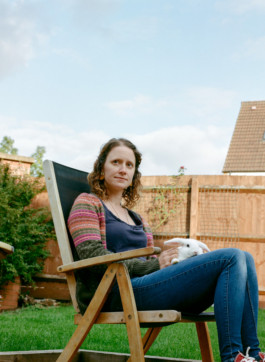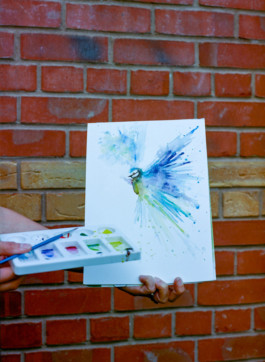Joanna: “Some people who you think are fragile actually are strong. They have coped better than the rest of us”


listen:
Content warning: contains references to mental illness
Photography: Myah Jeffers
Audio Producer: Nathan Gower
read:
I’ve always loved art, I’ve always loved sort of being creative. And I decided it was a time maybe to pick up my paintbrush and try and get a bit better at watercolour, which I have always been poor at. But actually, that became a real solace and a sort of refuge for me to be able to sit down and paint and work out some of those days that had been a bit heavier. Somehow that process of creating something and creating something, I guess, with a bit of order as well, helped to deal with the things that were a bit more chaotic and where I couldn’t fix them. It’s – it’s not our job anyway, to fix things.
I’m Jo, I work as a doctor in Psychiatry, I’m currently working with adults with mental illness.
I’ve been living in Leicester since I started at medical school, which was back in 2003. So 17 years now. I started working in psychiatry after a lot of deliberation about different areas of medicine. Mainly because I like people’s stories. I like hearing about what people are like, what makes them tick, what gives them hope. I think having done several specialties and finding that I was treating symptoms and maybe shortness of breath, or people having bleeding disorders, or… I felt that I was missing the point. Because we’re not just illnesses. I think we are people who live and breathe and have meaning to our lives other than just what makes us sick.
Day to day, I work with individuals aged between 18 and 65. And they have a range of different illnesses. I guess because I was working in the city at the time – there were lots of severe and enduring mental illnesses, such as schizophrenia, and bipolar affective disorder, depression, quite a lot of anxiety disorders, neuroses. So the people I worked with were often very vulnerable, often lacking in social support, and I guess are much more isolated than you or I might feel day–to–day.
During lockdown there was a strange first two weeks where everything went quiet. But almost as soon as that finished, like a wave there came this sort of wave of people who’d never been unwell with their mental health before actually – they’d never experienced depression or psychosis. They’d never experienced any of those things. They’d been well, young, fit individuals with jobs. They were struggling with what they believed about the world – so a sense that it was all a huge hoax. Something about the isolation, and this change in people’s social circumstances was causing people to present in ways that we hadn’t seen.
Part of my role out of hours particularly was assessing patients to see if they needed to come into hospital. This is always a really huge responsibility in psychiatry, largely because actually, we have the legal powers to admit someone, even if they don’t want to be admitted. It’s an area that I’ve always found fascinating, but it’s also incredibly hard sometimes because you’re admitting someone who is absolutely rejecting the idea they need to be in hospital. During lockdown this became… I found this emotionally much more of a strain. And actually, I was considering if I was admitting someone to hospital that they may not see their family or friends – that they wouldn’t be allowed visitors because of the restrictions.
During lockdown, I was trying to balance child care. And that, for me meant starting to do some more out of hours work on emergency assessments. And the daily routine changed quite a lot as well because my clinics became telephone contacts rather than face to face, which was hugely different. In psychiatry, we rely hugely on someone’s nonverbal gestures: the things that they don’t say, the way that they don’t say them, their facial expressions and, actually, all of those things were gone. My non–urgent work became very much from home. So a huge difference for me was that actually I was hearing the stories - of often distressed individuals, often very sad individuals – I was hearing all these stories at home. For me that was quite hard. That was my safe space. That’s where I live. That’s where I look after the kids, that’s where I’m with my husband. Actually, suddenly, that was a place where people’s thoughts of suicide, or people’s very disturbed beliefs came into my living room, my kitchen. And that was really hard. I - along with them, all of my colleagues – really miss the corridor conversations. We missed the informal chats, and the sort of sense checks on what we were doing. The whole feeling definitely, for me was actually an intense sense of loneliness, sometimes in the work.
I was worried that we were sort of looking at mortality and death rates. That’s all I heard about, and forgetting about what we talked about as morbidity, people’s actual quality of life, being affected. I felt really sad, to be honest, on one level. And on another level, I felt really angry. I felt a sense that actually, we were being treated as bodies that needed to keep breathing and our hearts beating and our brains, you know, functioning, when actually there was a sense that actually life was… that’s all life was. For many people, they were losing the social support, things like day centres, carers stopped visiting. And actually, those things are lifelines for the people we see. And I worried about the fact that there was this blanket restriction, which was neglecting to remember that some people literally keep their lives - definitely their quality of life and sometimes their actual life – through these means. Yeah, for period, I was really quite angry.
I know many of us have talked about going into a period where we actually have a lot more new episodes of mental illness. I guess one big area that I think we’ll see is grief. I guess I’m thinking about those who’ve lost loved ones during this time, perhaps haven’t been able to go to funerals, haven’t seen them before they died. In addition to that, I think, I imagine there’s going to be a big difference in social inequality. So I think happy families will have done all right during this, I think difficult families will have struggled. Within psychiatry, we usually see the outworkings of that, we see people who’ve been in unhappy homes, where there’s perhaps been domestic violence or just huge displays of emotional sort of disregulation, they tend to come to us.
Having always loved people and that being the reason I came into psychiatry, I think it’s been a really interesting time to watch people. What I’ve seen is actually twofold.
One is that some people who you think are fragile actually are strong - that they have coped better than the rest of us. They’re almost used to dealing with crisis. This crisis has just been one of many they’ve dealt with their whole lives.
And actually they’ve managed and they’ve somehow been stronger than some of us who are used to things being okay.
An Empathy Museum project made with the support of NHS England and NHS Improvement, The Health Foundation, and Arts Council England